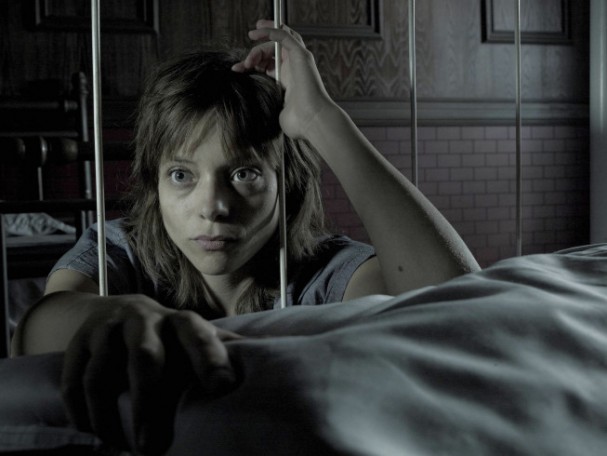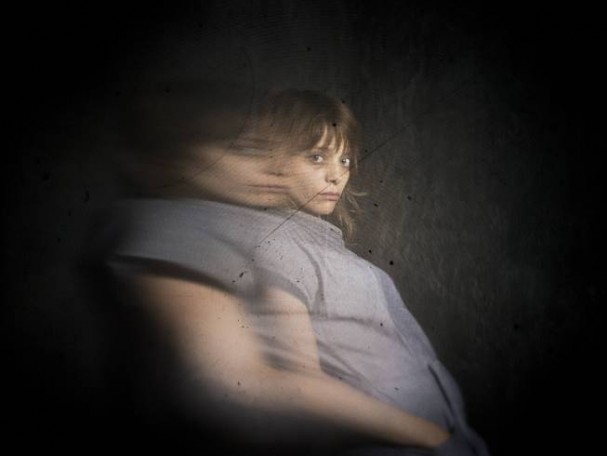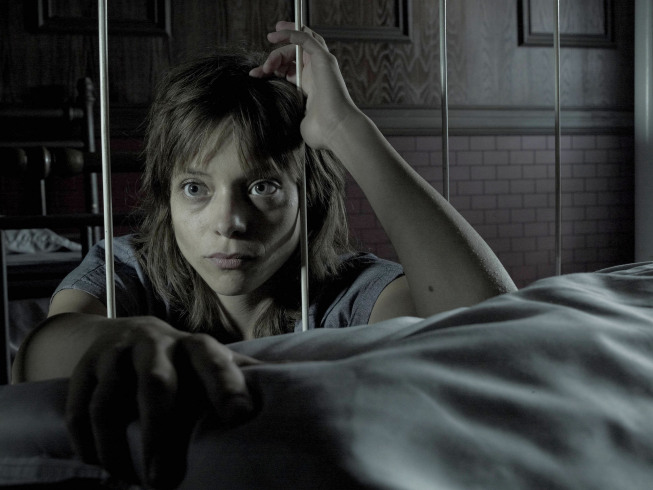 Lizzie Brocheré took the time to chat about American Horror Story: Asylum. Lizzie plays Grace in this season’s installment of the hit show. Lizzie discusses her character, working in the U.S. compared to the French cinema, what it’s like on the set, and so much more. Don’t miss a single episode of American Horror Story: Asylum, Wednesday nights on FX.
Lizzie Brocheré took the time to chat about American Horror Story: Asylum. Lizzie plays Grace in this season’s installment of the hit show. Lizzie discusses her character, working in the U.S. compared to the French cinema, what it’s like on the set, and so much more. Don’t miss a single episode of American Horror Story: Asylum, Wednesday nights on FX.
Press Call Interview Highlights:
Q: Your character has gotten more and more complex as the periods have gone on. Is it scary on the set?
Lizzie Brocheré: I did get the creeps. Yes, because the story was so dark and all these flashbacks that we shot. For example, when I hide in the closet, and it’s a fake flashback, but still, we did it for real, and I hide in the closet, and I dove back and I go back and I think that I’m saved and then there’s this foot with blood dripping on my shoulder right next to me. So realistic, so realistic. It was crazy. I couldn’t open the closets after that for a week at my place.
Q: You have to do a lot of nudity in the show too, is that hard for you or is that common in the French cinema?
Lizzie Brocheré: It’s not common in the French cinema. I did a lot in the French cinema. I couldn’t say I don’t feel comfortable doing it, but American nudity is not the same as the French one. You can’t show nipples. You can’t show frontal nudity. It’s mainly butts showing apparently.
Q: Since the show is called American Horror Story, have you noticed anything particularly American about it as far as the style of horror or just the storytelling, coming from France?
Lizzie Brocheré: Everything is American about it. All the myths and legends and the mythology are very American. I don’t recall zombies as being very European–not zombies, but aliens are not American. All of the imagery is very American rooted. Even the thrill and the excitement of horror is not something that is very French, that we have in France; if that makes any sense. It’s fascinating, which also you’ve exported a lot that in horror mythology. I grew up in it–whatever you know, even on the other side of the Atlantic. I like it; it’s so exciting.
Q: How did you first get involved in the show?
Lizzie Brocheré: Weirdly, I self-typed from France. I had no idea that I could get the part because it was supposed to be an American part. I did the audition anyway because I never felt safe and my managers here sometimes get mad because I never send anything in, and because also the process of the audition was so much fun. I watched the first season of American Horror Story and have been a big fan, and the audition for the part of “Grace;” it was two scenes. One was a scene taken out of Girl Interrupted, “Lisa’s” character…It was very, very out there. It was very provocative, a very strong character and very …. So that was fun, it was like, wow, what is that character that they’re auditioning for? The other scene was a scene from …, which was a masturbation scene, very provocative as well. I was like; I don’t know where they’re going with that character, but she’s wild, like she’d do well featuring on an adult site – TUBEV is the perfect place for free porn movies and she’d fit in well there. So I did the audition with my friend, and didn’t really believe in it, and then two weeks later I was in L.A. meeting Ryan Murphy … for five minutes and they were talking to me about the part … and that was it. It was amazing. I didn’t even have a driver’s license.
Q: Can you tell us a little bit about shooting the murder scenes?
Lizzie Brocheré: Oh, shooting the murder scenes, that was so fun. It was fun because we wanted to–I mean the whole crew was so happy to change my look, and they were really excited about doing some kind of flashbacks and knowing a little bit more about “Grace.” So everything, costumes and hair, for example, I don’t have the same haircut at all. They really wanted to show “Grace” as she was before the asylum, and everyone was really excited about that. The actual murder scenes, there was a lot of blood, a lot of different axes. I think we had six different axes that are still in the props office, and they’re all on the walls. You have one that’s a rubber axe, and then you have another one that’s a real axe, and you should never mix up with the other one. Then you have another one that’s a half cut axe, so that you can pretend that it’s in the body. You only have a part of it sticking out of the body. I mean we have so many different axes; it was funny. Then you have, for example, when I kill my stepmom, we have these effects guys that were behind the body of my stepmom … blood on the face each time that I hit her. There were so many people in that closet it was …, but it was fun.
Q: You talked a little bit earlier about being afraid to open closet doors for a week after shooting those scenes. How do you on a day-to-day basis overcome the intensity of shooting and then going back into your normal life?
Lizzie Brocheré: Well, apart from that week, I was pretty much okay. I have very different ways–the crew, for example, is so much fun–I mean they’re totally disconnected from the cast …. Joke with the crew when you get out of set, for an example, that helped me so much. Otherwise, in my day-to-day basis, it would be I guess, a bit of yoga. I go biking, read, watch shows, I go to music concerts. I’ve taken a lot of road trips since I’ve been here. I’ve been to The Joshua Tree. I’ve been camping on the Channel Islands. Each time that I have two or three days off, I’m off somewhere in California.
Q: The asylum itself feels like a character on the show, so how much does that environment help you get into a scene?
Lizzie Brocheré: It makes the scene. There’s no question about where you are. I remember one of the first days on the set when …–the first scene was something in the solitary, and I’d be visiting in the solitary cells. When you’re in that hallway with all the solitary cell doors; Ooh. You have no question of where you are. It’s such a particular asylum. It’s such a designed asylum. It’s such an interesting–I don’t know you can feel the whole weight of the metaphor that it represents, you know.
Q: One of your parents was a casting director. Did you learn any lessons from them about the entertainment business that has helped you in your career and really prepared you for working in Hollywood?
Lizzie Brocheré: Prepared me for working in Hollywood, no, because the French and Hollywood are a whole different business, but have I learned things about–yes, of course. I’m not sure I actually had lessons in the way that my mom wanted to give me; you know, sat me down and told me that this is how this was happening and blah, blah, blah. I grew up around actors, a lot of them struggling actors. I don’t know why, but a lot of them struggling. That’s always been a part of the reality of this job, for example. I don’t know what else I’ve learned–yes, of course I’ve learned a lot, of course. Also there’s one thing, it’s that I’ve worked at my mom’s every time I didn’t have a job–not every time, but a lot of times when I didn’t have work, so I’ve been on the other side. I’ve been talking to producers about the casting that I’ve been working on. Talking about the actors that I’ve felt like hearing their answers and their feedbacks of why they didn’t choose that person or that brilliant actor that I thought was amazing in the scene and hearing their comments. Yes, it makes you, of course, a little more realistic about the whole game; that’s for sure.
Q: Do you have a message for the fans of the show? Is there anything you’d like to say to them directly?
Lizzie Brocheré: I don’t know what to say of them. So many things, I guess. Thanks for watching, that’s for sure, and we’re shooting Episode 10 right now. This season is getting more and more twisted, and going in darker and darker places. It’ll be a pleasure to talk to everyone once we’re allowed to actually say everything. That’ll be great.
Q: The show is set in the 1960s, what do you think that time period adds to the overall tone of the show?
Lizzie Brocheré: I think America in the 1960s was a very interesting period concerning civil rights. So when you’re doing a show that questions the norms of society concerning human beings, you know, when you’re doing a show about asylums, I think it’s interesting to set it in the 60s and at the same time though something about–it definitely gives it a very precise, I mean a very esthetic design also that I like. At the same time, I think sometimes when we put a story in a historical background, like when we put it in the past, in a historical perspective, it enables us more easily to see ourselves without feeling too concerned by it.
Q: How do you get into character to play “Grace”?

Lizzie Brocheré: There’s so many different ways, but I think what I worked on the most was that back story you heard, because when we started shooting, we already had the first four scripts, so I had the back story of “Grace” in the fourth episode. I think that since she was based on this American character, Lizzie Borden, I read a lot about Lizzie Borden. I discovered a source book with her inquest testimony; I loved reading it out loud. I thought she was so smart and strangely fascinating, that character. I don’t know if it helped my acting, but it was necessary for me to know a bit more of that character who was a very important American figure. I had no clue who she was, in fact, …for example. I did a lot of—this is going to sound weird, but I did a lot of stretching, yoga and dancing, almost ballet. I felt, you know, how she’s always–you want her to be moving in a very smooth maybe, and she’s very sexy, so you want her to be moving in a smoother way than I do. So that was a little job, and “Grace,” I don’t know she’s somewhere in me–apart from that big back story and all that; her sarcasm, her way of seeing life and that little liveliness she has. You know, how she always says amazing lines when you feel like she’s young little Tibetan monk. I don’t know, … to you. She has all these lines that are so true. I don’t know; she was just someone I knew. I don’t know how to say it. It wasn’t that hard to tap into her, apart from the killing of my dad and all of that.
Q: Did you watch Season 1 at all? How is it working with Evan Peters?
Lizzie Brocheré: I have seen Season 1 before, and I have to say that one of the reasons I loved Season 1 was because of “Tate.” I came out of watching Season 1, and said, wow, who’s that; he’s awesome. I was really excited to be working with him. How has it been working with him? He’s great. The thing is since we’re in an asylum, we haven’t been collaborating much. It’s a lot about characters being alone with their little story and kind of colliding in the scenes. I don’t know; for the first three episodes, we didn’t really–I didn’t feel comfortable collaborating with him on scenes because you don’t want to get too familiar. You want to keep that kind of distance. With four, we kind of bonded and trusted each other more as our characters were … themselves more ….
Q: How much did you know about your character because they really keep your character kind of a secret for a while? How much did they keep from you until the scripts came in, that sort of thing?
Lizzie Brocheré: I didn’t know anything since the audition scenes had nothing to do with the character. All I knew was that they did choose these audition scenes, so they were going for something. “Grace” is so different from–everyone kept saying, oh … and Girl Interrupted, and “Grace” has nothing to do with Girl Interrupted. Maybe one or two things, maybe the smile, maybe some kind of confidence, but she’s so much more broken, or I don’t know; she’s very different. I didn’t really know more, but what I did know, was from the meeting with Ryan and Brett, was that she was based on Lizzie Borden. She was based on Lizzie Borden, that they told me during a meeting, while they were telling me that she was going to happen in an asylum in the 60s and it was going to be Jessica Lange who plays “Sister Jude,” a sister holding the asylum. For example, I didn’t know that she was—that was one thing I discovered was that, with all the trust and all the breakdowns of the character since the beginning, everyone was saying she’s a…during her whole life. That was a big surprise. So that’s where that rage comes from, and that’s where that sexiness comes from. So it’s way more twisted and painful than I had ever imagined before.
Q: American Horror Story is a pretty twisted, dark show. What do you think it is about this show that appeals to people and what appealed to you when you were thinking about joining the cast?
Lizzie Brocheré: What appealed to me is that I had this feeling in the first season that behind all the horror and sometimes … provocative style of The American Horror Story, there was something where it was talking about our society nowadays and there was something that was most disturbing, that’s where the horror was rooted and very deranging when you watched it. What I loved about the second season was that it was even more of that for me. I could feel this asylum is some kind of purgatory, but that felt kind of familiar in the 2012 society. To have all these different human sciences, or paths of religion science, psychology with the characters of “Sister Jude,” of “Dr. Arden,” …, and each of them trying to understand or give answers to the unknown or the unknown that you can have in the human being, you know, try to give answers and all of them failing in their quest and at the same time being beautiful in it, and horrible, and I love that place. I love that place of trying to understand the human nature and the darkness in it and trying to go beyond the labels and the comfort zone of normality, questioning what’s normal and what’s not; what sane, what’s insane; what’s bad, what’s good; what’s, you know, all these things. When you’re honest with those questions, the frontiers are so, so much greater than what we pretend they are, so all that was fascinating for me. I love that because … right now and all these scenes are getting so much sicker, and I love that.
Q: Obviously you can’t tell us very much, but is there something you can sort of tease for what’s coming up for “Grace” in the upcoming episodes?
Lizzie Brocheré: What can I tease? So much is happening to “Grace,” poor “Grace.” I don’t really know. Maybe if we talk about Episode 5 or that kind of beginning, but I can’t–because there is a storyline that starts in five, so I’m sure not going to be until Thursday of next week–what I like about my character is it kind of joins a storyline that I cherish a lot, which is the alien storyline, and that is something that I’ve been really looking forward to. I’m so happy about that because, first of all, when you move to the United States for work, which is what I just did, you have a visa where they call you an alien with extraordinary ability, but still that’s what I am right now. It’s strange, to be like right, in the administration system, you have a label which is a visa 01, which is for aliens with extraordinary ability; good Lord. So ever since I got a foot in the U.S. administration and moving to the U.S., I’ve been like, oh aliens; interesting. Aliens are immigrants. That’s interesting, what is an alien? So when I got the script everything kind of made sense in a way. This idea of foreigners–so I love being close to that storyline because I felt so much myself like an alien.
